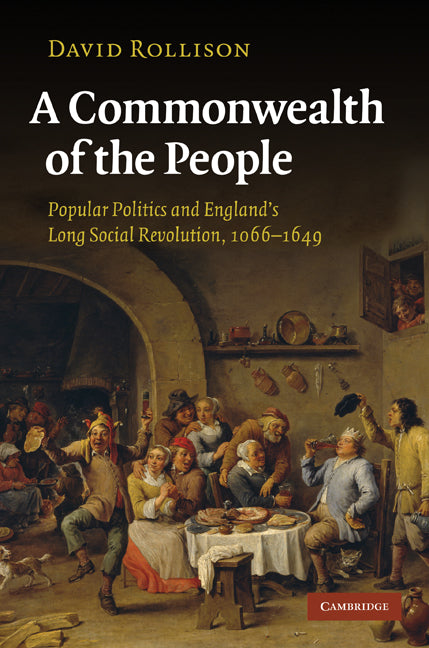Freshly Printed - allow 8 days lead
Couldn't load pickup availability
A Commonwealth of the People
Popular Politics and England's Long Social Revolution, 1066–1649
Extraordinarily broad-ranging history of the rise of the English language and of popular politics in medieval and early modern England.
David Rollison (Author)
9780521853736, Cambridge University Press
Hardback, published 21 January 2010
492 pages, 1 b/w illus.
23.4 x 15.9 x 2.6 cm, 0.9 kg
'This is a big, bold enclosure riot of a book. Like rebels breaking down fences separating them from their common land, David Rollison transgresses long-established conventions and boundaries in the historical discipline. In A Commonwealth of the People, Rollison fractures divisions between the medieval and early modern periods, levels distinctions between social and political history, takes constitutional history on a sharp linguistic turn, and merges the local with the global. Rollison will incur the wrath of those who have an investment in the maintenance of the enclosure of the historical discipline. He also does a great job of rewriting an integrated history of medieval and early modern England from the bottom up. This book represents a defining moment in the new social history of politics.' Andy Wood, Professor of Social History, University of East Anglia
In 1500 fewer than three million people spoke English; today English speakers number at least a billion worldwide. This book asks how and why a small island people became the nucleus of an empire 'on which the sun never set'. David Rollison argues that the 'English explosion' was the outcome of a long social revolution with roots deep in the medieval past. A succession of crises from the Norman Conquest to the English Revolution were causal links and chains of collective memory in a unique, vernacular, populist movement. The keyword of this long revolution, 'commonwealth', has been largely invisible in traditional constitutional history. This panoramic synthesis of political, intellectual, social, cultural, religious, economic, literary and linguistic movements offers a 'new constitutional history' in which state institutions and power elites were subordinate and answerable to a greater community that the early modern English called 'commonwealth' and we call 'society'.
Preface: points of departure
Introduction: an uncommon tradition
Part I. The Emergent Commonalty: 1. What came before: antecedent structures and emergent themes
2. The formation of a constitutional landscape, c. 1159–1327
3. The power of a common language
Part II. Accumulating a Tradition: Popular Resistance and Rebellion, 1327–1549: 4. Discords, quarrels and factions of the commonalty: an ensemble of popular demands, 1328–81
5. The spectre of commonalty: popular rebellion and the commonweal, 1381–1549
Part III. The English Explosion: 6. How trade became an affair of state: the politics of industry, 1381–1640
7. Touching the wires: industry and empire
Part IV. The Empowered Community: 8. 'The first pace that is sick': the revolution of politics in Shakespeare's Coriolanus
9. 'Boiling hot with questions': the English Revolution and the parting of the ways.
Subject Areas: Politics & government [JP], Social & cultural history [HBTB], Early modern history: c 1450/1500 to c 1700 [HBLH], Early history: c 500 to c 1450/1500 [HBLC], British & Irish history [HBJD1]


